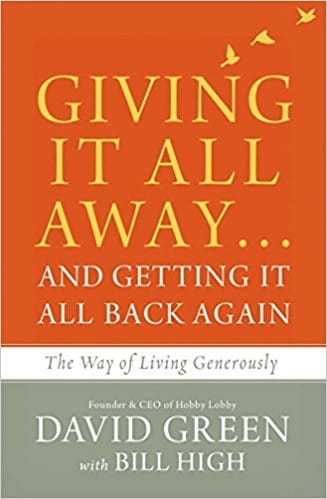6 Ways to Leave a Legacy of Generosity

I recently had the privilege of sitting down with David Green, CEO and Founder of Hobby Lobby Stores. David and his family are widely considered among the most generous families in the U.S. with regard to funding faith-based projects.
David is a delightful man, and in addition to leading one of the greatest businesses in America, he truly sees himself as an agent, helping nonprofit organizations accomplish their missions.
His new book, Giving It All Away and Getting It All Back Again — to be released April 25 by Zondervan — talks about (among other topics) leaving a legacy.
As we met, David previewed some key concepts of the book for me:
1. Make generosity a family priority.
Proverbs 22:6 says, “Start children off on the way they should go, and even when they are old they will not turn from it” (NIV).
The habits we instill in our children as they’re growing up become a true part of their identity. Teach them to be generous when they’re young and they’ll grow up reaping all the benefits of generosity and faith.
And if you teach them a variety of ways to be generous, then let them follow their own calling — they’ll learn to choose how to give rather than whether to give!
2. Do what the Bible says about generosity.
James 2:14-17 says, “Suppose a brother or a sister is without clothes and daily food. If one of you says to them, ‘Go in peace; keep warm and well fed,’ but does nothing about their physical needs, what good is it? In the same way, faith by itself, if it is not accompanied by action, is dead” (NIV).
Faith and giving go hand in hand. The Bible repeatedly mentions generosity and giving. We need to help our brothers and sisters consistently, regardless of our own struggles and trials.
We can’t expect God to reward us when we’re focused on our own well-being alone and not helping those around us.
Let generosity overpower greed — and live the life of giving that God has called you to.
3. Understand that generosity is eternal.
Luke 12:33-34 says, “Sell your possessions and give to those in need. This will store up treasure for you in heaven! And the purses of heaven never get old or develop holes. Your treasure will be safe; no thief can steal it and no moth can destroy it. Wherever your treasure is, there the desires of your heart will also be” (NLT).
Invest your life in giving, and you’ll not only see the benefits for years to come — your generosity will also be rewarded in the afterlife.
A lifestyle of generosity is one thing money can’t buy — and it will produce super-valuable benefits from this life into the next!
4. Put generosity before your own success.
Matthew 6:24 says, “No one can serve two masters. Either you will hate the one and love the other, or you will be devoted to the one and despise the other. You cannot serve both God and money” (NIV).
It’s easy to tell yourself that you don’t have enough money to be generous, especially in a culture where so many people define themselves by how much money they have — the world’s definition of “success.”
But money and greed tend to go hand in hand.
In order to leave behind a legacy of generosity, it’s important to understand that wealth and worldly success aren’t important past this life.
As a child of God, you live by a different standard: In God’s economy, generosity has much higher value than success or wealth.
5. You can be generous without being wealthy.
When Jesus saw well-off people giving big offerings and an impoverished woman making a miniscule offering (Luke 21:3-4), He told His friends, “this poor widow has put in more than all the others. All these people gave their gifts out of their wealth; but she out of her poverty put in all she had to live on” (NIV).
Truly generous people don’t let their own “lack” keep them from living a life of generosity.
Sometimes money isn’t what we’re called to give. It’s amazing to see how God can work through people in ways that don’t involve money at all.
Even when you’re in financially tough times, you can be generous in giving of your time and talents.
Perhaps you’ll be called on to utilize your carpentry skills to help fix up a family’s home after a strong windstorm. Or babysit for a single mom who has a job interview.
Generosity is often expressed in small gestures that might seem less than critical at the time, but can make a beautiful difference in someone’s life.
6. Generosity is a gift.
“Whatever you do, work at it with all your heart, as working for the Lord,” Colossians 3:23-24(NIV) says, “not for human masters, since you know that you will receive an inheritance from the Lord as a reward. It is the Lord Christ you are serving.”
It’s easy to get caught up in the activities of life and make excuses about why you can’t be generous at the moment.
Maybe you’ve had a hard week at work, or your in-laws are in town, and the last thing you want to do is your weekly volunteer shift.
But when you feel your generosity is a burden, take a step back and remember Whom you’re working for: The Lord!
One final thought…
In my 30+ years working with nonprofit organizations and churches— including my current work at Museum of the Bible — one truth has been constant:
Generosity is a lifestyle — and adopting it can completely change your life and the lives of those around you.
As a Christ-follower, you have a duty to live a generous life — and as you do, you’ll leave a legacy of generosity that will last for many years to come.
Having lived and worked in the fundraising space for almost my entire career, I’ve often been asked, “What is it that keeps you going in this business?”
Some people imagine I’m most inspired by that moment when someone hands over that big check or gives that outrageously large sum of money…
But that’s not it at all. It’s actually that moment when you see the twinkle in the eye. That moment when someone realizes they can do something that’s bigger than they are. When the calling meets a point of action. When they realize they can change the world in some very real way.
That’s the joy of the generous life!

Image courtesy: Pexels.com
Publication date: April 25, 2017
Originally published April 25, 2017.




